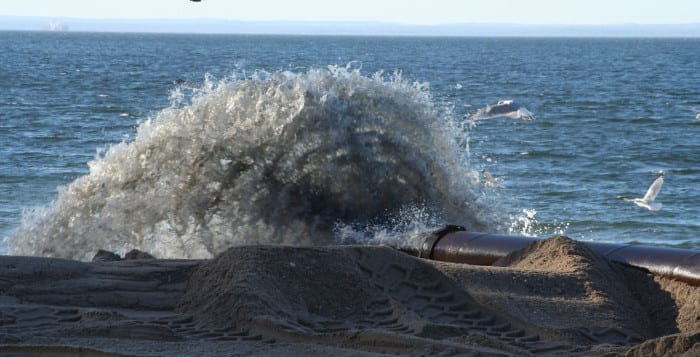Local leaders oppose 10-year federal dredging plan

Town and state officials gathered at Cedar Beach on Monday in opposition to the plan by the U.S. Army Corps of Engineers and U.S. Environmental Protection Agency to continue dumping dredge waste into the Long Island Sound.
The organizations were dumping dredge spoils into the Connecticut River, which spills into the Sound. According to Sen. Ken LaValle spokesman Greg Blower, town and state officials are not sure what chemicals or sediments were disposed of in the river, especially with the variety of manufacturing facilities around that area.
Ten years ago, the organizations were asked to create a plan that would propose an alternative area where they could dump the waste. Officials including Brookhaven Town Supervisor Ed Romaine (R), Councilwoman Jane Bonner (C-Rocky Point), Assemblyman Steve Englebright (D-Setauket) and LaValle (R-Port Jefferson) received the plan at 8:30 a.m. Tuesday morning, according to Anthony Graves, the town’s chief environmental analyst.
Originally, the officials only had seven days to make public comment on the 1,300-page plan, but after Romaine brought this into question, the date was altered, allowing people to make their comments until Oct. 5.
Graves said the Army Corps of Engineers and the EPA were told in 2005 to create this report, which didn’t address the concerns of town and state officials. According to Bonner, those organizations recommended continuing to deposit the waste in the Sound.
Bonner said, “We have better technology now and we know dredge spoils can be repurposed for capping landfills.”
While there are alternative dumping sites, such as abandoned mines and landfills, Romaine said the organizations opted for a cheaper way.
“The only reason why the Army Corps of Engineers is recommending it is because it’s the cheapest method,” Romaine said. “Shame on them.”
Romaine said the spoils have compromised marine life, including a decline in the fish and shellfish population. He added that the spoils are most heavily contributing to the lobster die-off in the water. Even though the dumping of the waste is from Connecticut, Romaine said, “water bodies like the Sound don’t respect state boundary lines.”
According to Graves, around $1.7 million was spent cleaning the Sound. LaValle said these efforts were a waste of money because the Army Corps of Engineers and the EPA continued to dump dredge waste in the water during the cleanup.
“The two measures really don’t make sense and we have spent 10 years and all that money,” LaValle said. “[It] shows lack of common sense. I think the only thing it did was keep some researchers occupied for 10 years.”
There are two local public hearings, one on Monday, Aug. 24, in Port Jefferson’s Village Center and the other on Tuesday, Aug. 25, at the Long Island Marriott in Uniondale. There will also be hearings in Connecticut.
Registration is required to attend the meetings, and comments can be forwarded no later than Oct. 5.
“We live on an island,” Romaine said. “Many of the waterways on our island are already impacted. We don’t need any more impaired waterways. We need to start improving the Long Island Sound.”






